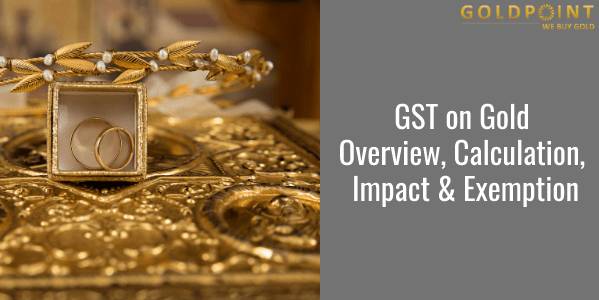
- ജനു, 03 2023
- | Sell Gold
GST on Gold – Overview, Calculation, Impact & Exemption
The Goods & Services Tax (GST) was introduced in India in 2017 to streamline the indirect taxation system in the country. GST, or goods and services tax, is a consumption tax levied on buying and selling goods and services in India. GST is also applicable on the sale and purchase of gold and jewellery buyers – both individuals and jewellery makers have to pay this tax.
This article summarises how gold is taxed under GST, the implications, and available exemptions.
What is the GST on Gold?
As explained above, GST is a tax levied by the Government of India on selling and purchasing goods and services. GST on gold is the tax levied on buyers of gold – gold as raw material, gold as jewellery, etc.
| Particulars | Rate under previous tax structure | Rates under GST tax structure |
| VAT | 1% | Nil |
| Sales tax | 1% | Nil |
| Making charges (Gold) | Nil | 5% |
| Import duty | 10% | 10% |
| GST Rate (Gold) | Nil | 3% |
Taxes significantly influence the cost of production, which ultimately impacts the price of gold items in the market. Sellers of gold are not required to pay the GST; hence, they are saved this additional burden.
What is the impact of GST on gold in India?
If we compare the impact of GST on gold with other commodities, then the GST levied on gold is just 3%, whereas it can be 28% for many other valuable goods. The direct increase in the prices of gold is because there is a 3% GST on the import of gold – it has directly impacted the price of final gold & jewellery.
Initially, when the GST was rolled out, making charges for gold & jewellery were at 18%. The price of gold soared, and many jewellery councils then appealed for a reduction in the GST – the GST on the marking charges was making gold unaffordable to many consumers. It was then reduced and fixed at 5%.
GST : Gold Exemptions
In 2018, a GST exemption was announced at the 31st GST Council meeting. As a result, notified agencies do not charge GST on gold supplies made to GST-registered exporters of gold & jewellery.
By taking this action, the tax burden on Indian exporters of gold jewellery was reduced, making it easier and more affordable for gold buyers.
GST : Gold Jewellery making charges?
There is a direct impact on the jewellery cost because of GST on making charges. It is standardised at 5%, regardless of the cost or value of the gold. According to Section 8 of the CGST Act, gold jewellery or ornaments are categorised as goods and services.
No GST is imposed when individuals exchange old gold pieces for new ones at jewellery shops or sell gold jewellery. Any repair works on jewellery are considered making charges subject to 5% GST.
How to compute GST on gold?
The Central Goods and Services Tax Act 2017 decides the GST on gold. Under Section 8 of the CGST Act, gold is a product; hence, a 3% GST is applicable when gold jewellery is sold or purchased. Earlier, the tax was 5% of the total value of the jewellery.
Let us look at how to calculate the gold price on your jewellery:
Gold Price (inclusive of GST) = Gold price per gram x weight of gold in grams + making charges + GST on making charges + 3% GST
Conclusion
When sellers decide to sell gold for cash, they must consider the market value of gold, its purity, and its weight. Make sure buyers do not add the weight of the stones embellished in the gold jewellery to the gold’s weight. They also need to know the taxes associated with selling gold. Before everything else, selecting a reliable buyer is the most important. You should choose a company that provides more benefits than traditional buyers and sellers of gold jewellery.
The process of selling gold with Muthoot Gold Point is smooth. We employ cutting-edge technology to confirm the gold’s current price, weight, and purity. In Mumbai and Bangalore, our van can come directly to your house to buy the gold. Sellers are guaranteed the best price since the gold is evaluated before them. Sellers can also use their gold price calculator to know the expected price.
Frequently Asked Questions
What is the GST on 22k gold?
The Goods and Services Tax (GST) is levied at a rate of 3% on the value of gold. Additionally, GST may also be applied to making charges, amounting to 5% of those charges.
How do you avoid GST on gold?
Resale: When selling old gold, there is no tax imposed if the proceeds are used to purchase new gold jewelry. This means that in order to avoid taxes, you must exchange your old gold for new gold. Prior to GST, there was a 3% charge on the sale of old gold, even if you were purchasing new gold at the same time.
How much GST is 8 grams gold?
GST on Gold Jewellery: Goods and Services Tax (GST) applicable to gold jewellery amounts to 5% of the making charges. Generally, GST on gold jewellery is either a fixed charge or a fixed percentage based on the value of the gold.
What is the rule for GST 2023?
As per India Today Business Desk, starting from May 1, 2023, a new GST regulation has been made compulsory for businesses with an annual turnover of Rs 100 crore. These businesses are required to upload their electronic invoices on the Invoice Registration Portal (IRP) within seven days of issuing such invoices.









